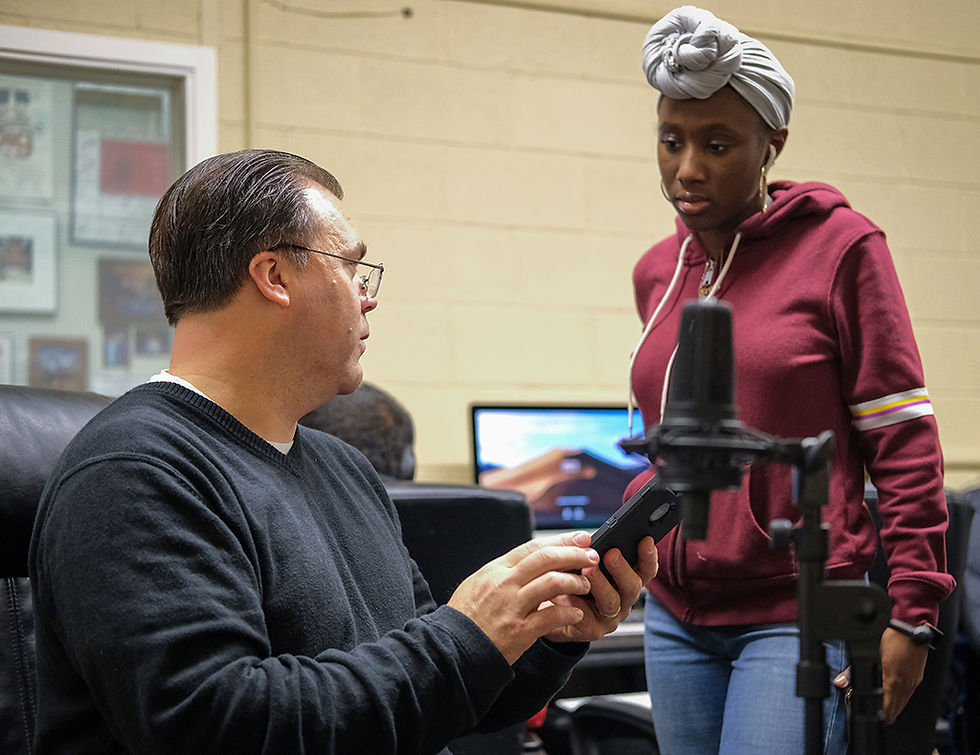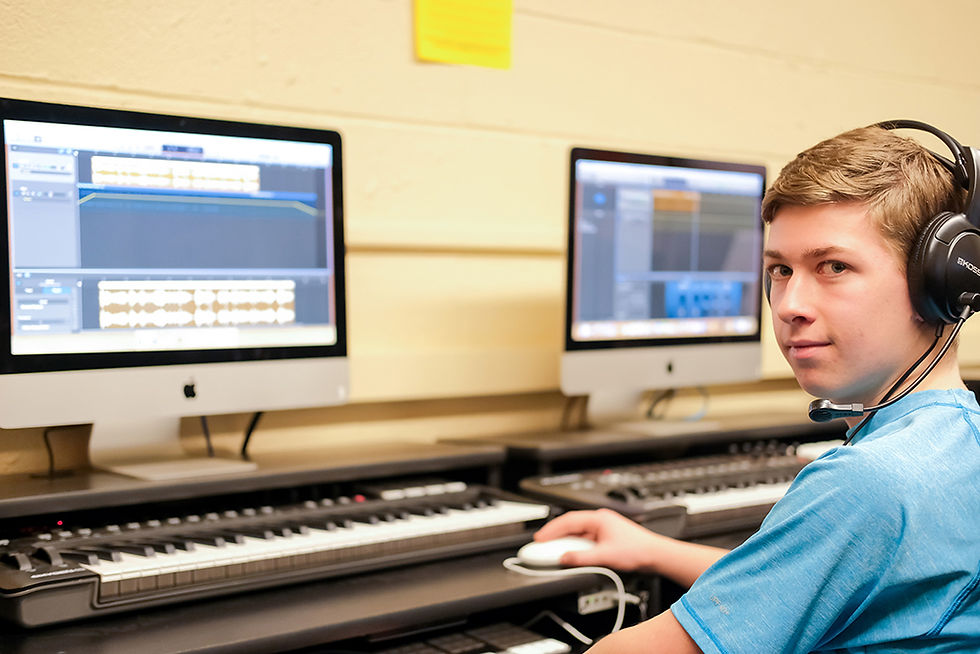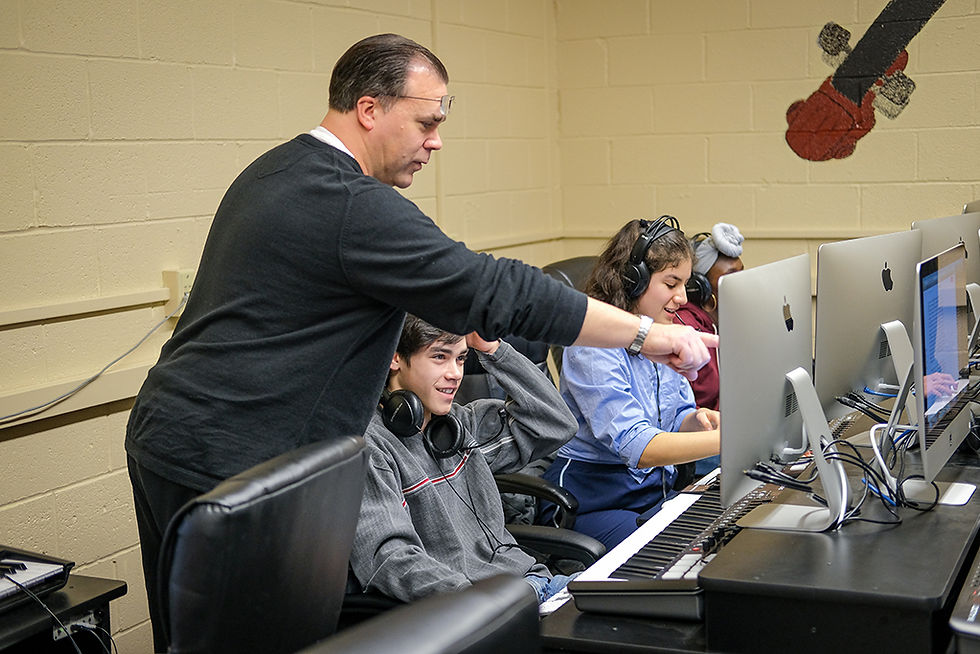STUDENTS MIX MUSIC AND FUN by Reba Auslander-Stevens and Ellen Dreyer
- ellencdonker
- Feb 1, 2020
- 5 min read
Columbia High School’s tech lab gets an upgrade
Step inside the music technology lab at Columbia High and you will be greeted not by the sounds of instruments tuning up or voices harmonizing, but by the sight of several rows of headphone-wearing students seated at computer stations, engaged in creating music using sophisticated software.

While this class is not new – it has been taught at CHS in some form for 15 years – the lab is newly state-of-the-art, following a full upgrade over the summer in 2019. James Manno, Fine Arts Supervisor of the South Orange Maplewood School District (SOMSD), made it his mission to modernize the outdated lab equipment and pushed for the funding to get it done. Says Manno, “I noticed how antiquated the lab was, and since I have built other music tech labs and have seen their positive impact on students, as well as the relevance of music production in the 21st century, I decided something needed to be done. I expressed my vision to SOMSD School Business Administrator Paul Roth and he was very supportive of the initiative.”
The course is taught by CHS band director Peter Bauer, who jokes that “the new lab is like going from eating at a Wendy’s to eating at a five-star restaurant.” With all the functionality of a professional music production studio, Bauer says the lab offers students the experience of working on dependable equipment that lets them focus on their creativity. The course was first introduced as a class called Musicians’ Workshop, which, according to Bauer, “involved little to any tech at all.” The curriculum has grown along with the availability of new technology, hardware, and software.

According to junior Sofia Lopez, choosing Music Tech was a no-brainer. She has been interested in music composition for several years, producing original music using Garage Band. “I took the course because I wanted to learn new things,” she says, adding that composing music is her “creative outlet.” Freshman Ryan Baum concurs. Ever since he produced a song for a friend in eighth grade, he has wanted to learn more about making and editing music.
But Music Tech also provides students with a solid understanding of music basics. Bauer says, “We use the phrase ‘play the computer’ because that’s basically what the students are doing. Instead of playing an instrument or singing, their “instrument” is their computer workstation, but the work that they do is no less creative or technically demanding.”
The new lab offers hardware and interfaces that allow each student to work in his or her own “space,” with a headset that is connected to each workstation. Through Garage Band, Ableton Live, and other software, students can record different tracks and collaborate with others.

Bauer monitors each of the workstations from a central teacher station, “dropping in” to listen to what the students are doing without interrupting their work. If students need assistance or input, a call button at their station will allow him to connect to their headset to speak with them individually. From his desk, he is also able to connect to each computer and see what the student is doing, even taking control to demonstrate techniques without having to roam about the room. “This helps to keep the students focused and on task, which has made their class time even more productive,” Bauer says, adding that the music tech lab is now also “running more sophisticated and real-life software programs” of the sort that the students would be likely to find in a professional studio.
What are some favorite moments in class? Lopez enjoyed “the ringtone project,” which requires creating a song loop 45 seconds long. This project “expanded on an idea I had at home...and doing this didn’t feel like a class.” Baum also enjoys the class projects and building his knowledge base. “We started with three or five tracks, going to ten tracks.”
Music Technology is a one-semester course that fulfills a practical arts requirement for graduation. There is no prerequisite other than having some background with music, whether formal or informal. But there are space limitations and only half of the 150 students that registered for it in the 2019/2020 school year were able to get in.
“The Lab is now modern but it’s also relatively small, and since it’s taught by Mr. Bauer who runs the entire CHS band and marching band program, it can unfortunately only be offered for two out of nine class periods,” says Manno. “This is symptomatic of our broader issue of having only three music directors [for chorus and orchestra, in addition to band] for more than 700 students.”

Here’s where the CHS Music Parents Association (CHSMPA) comes in. A nonprofit organization comprised of parent volunteers that supports the CHS music program, CHSMPA has been lobbying the SOMSD board of education to fund at least two-and-a-half more full-time music teachers. At a meeting with the school board in October of 2019, CHSMPA co-presidents Yvette Holowczak and Jennifer Meusel made a compelling plea for more resources, saying, “The CHS music faculty is at its maximum capacity, so expanding class sizes is not an option. Our band, orchestra and choir should have the right number of experienced faculty to ensure that no music student is left behind. The SOMSD should strive to provide our students with access to the highest level of quality music education.”
“It is becoming impossible to even sustain reasonable class sizes and productive teaching by only three music directors – and they are the best in the business so to speak,” declared Holowczak. “We don’t take our tasks lightly and wouldn’t be pushing so hard for this if it wasn’t necessary.”

For some students, Music Technology can also provide a means to explore future careers. Several of the more advanced students who have taken the course have gone to college to study digital music, production, and composition. In the future, Bauer hopes to offer a Music Technology II class so that serious students can gain the tools and skills they need to pursue a career in this field.
Some, such as Lopez, who will graduate in 2021, may be on this path already. “When I get absorbed by one of my projects I feel like I’m working in a professional setting and could be anywhere,” she says.
Then the bell rings and onto the next class, but the music making never ends.
Reba Auslander-Stevens owns RAliance Communications, LLC, a healthcare public relations firm. Ellen Dreyer is an editor and writer whose publications include the young adult novel “The Glow Stone.” Both Reba and Ellen are board members of CHSMPA (Columbia High School Music Parents Association).







Comments